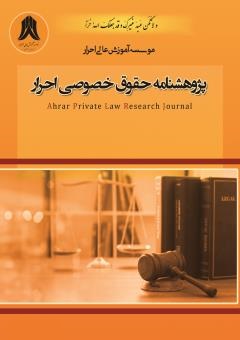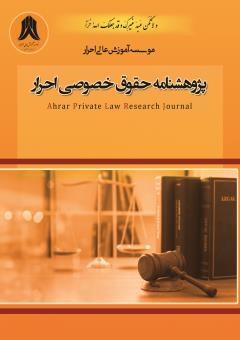A Critical Look at Judges' Civil Liability in Iranian Jurisprudence and Law
Subject Areas : حقوق مدنیShaghayegh Shaghayegh shamsi 1 * , Abedin momeni 2
1 - Master of Contemporary Jurisprudence and Islamic Penal Law, Department of Jurisprudence and Law, Faculty of Jurisprudence and Law, University of Islamic Religions and Religions, Tehran, Iran.
2 - Associate Professor of Theology and Islamic Studies, Department of Theology and Islamic Studies, Faculty of Theology and Islamic Studies, University of Tehran, Tehran, Iran.
Keywords: Civil Liability, Judge, Judge's Conditions, Compensation, Immunity, Jurisprudence of Islamic Religions, Iranian Law,
Abstract :
According to Article 171 of the Constitution, if a judge causes damage to another as a result of a mistake or fault in a case or in a sentence or in the application of a sentence to a particular case, he is the guarantor in case of fault. Otherwise, the compensation is done by the government. It seems that the principle of government responsibility for the judge's mistake in jurisprudential books was due to the necessity of ijtihad in judges, and jurists based on this condition the verdict issued by the judge was considered his fatwa and they believed that the judge rules by his ijtihad, so they put the responsibility for compensation on the treasury. But the important point is that he should not be granted judicial immunity, because everyone has a responsibility wherever he is, and he should be held accountable for that position and his mistakes, and the judge, like other members of society, is paid for the act of judging and this does not cause the government, which has no worker-employer relationship with the judge, accept compensation for the damages caused by act them. Therefore, the purpose of writing this article is to critique the judicial process in the civil liability of judges and to compensate the damages from the government. The research method in this study is analytical-descriptive and the method of collecting information is library and documentary.
Regulations of special clergy courts and courts approved in 1990.
Ibn Farhun, Burhan al-Din. )2011(. Commentary on Al-Hakam fi Usul al-Aqdiya and Manahaj al-Ahkam.
volume 1. Beirut: Maktaba al-Asriya.
Al-Taftazani, Saad al-Din.(2010), beta Brief meanings. volume 1. Qom: Dar al-Fekr.
Jafari Langroudi, Mohammad Jafar.( 2021). Civil rights of mortgage and peace. Tehran: Ganj Danesh.
Hosseini Nejad, Hossein Qoli.( 1991). Civil liability. Tehran: Academic Jihad Publications.
Haider, Ali.(2014). Darr al-Ahkam, description of Al-Ahkam magazine. Volume 12. Beirut: Dar Alam
al-Katb.
Khamenei, Mohammad.( 2012). Science of judge. Tehran: Tekab Production Publishing House.
Khomeini, Ruhollah. (2015). Tahrir al-Sila. Volume 2. Tehran: Imam Khomeini Organization and
Publishing Institute.
Zidane, Abdul Karim. (2015). Judiciary system in Islamic Sharia. Beirut: Al-Rasalah Al-Nashroon
Institute.
Sabzevari, Muhammad Bagharbin Muhammad Al-Momon.( 2002). Sufficient judgments. Qom: Al-
Nashar al-Islami Institute.
Sadr al-Nafafi, Seyyed Nasrallah. (1993). Judicial supervision of government actions in the Court of
Administrative Justice. Tehran: Shahriar Publishing.
Tabatabai Motman, Manouchehr, (1914). Administrative rights. Tehran: Organization for Studying and
Compiling Humanities Books of Universities (Samt).
Abdurrahman al-Bakr, Muhammad. (1988). Al-Qada'i authority and the personality of al-Qadi in the
Islamic system. Cairo: Al-Zahra L'Alam Arabi
Qasimzadeh, Seyyed Morteza. (2017). Fundamentals of civil responsibility. Tehran: Mizan.
Civil Procedure Law.
Constitution with amendments of (1989).
Law on disciplinary trial approved on 11/16/1928.
Amendment Law of the Organization of Justice approved on 6/17/1956.Civil liability law approved
02/07/1960.
Katouzian, Nasser.( 2015). Civil rights: non-contractual obligations (compulsory guarantee). volume 1.
Tehran: University of Tehran Printing and Publishing Institute.
Katouzian, Nasser. (1990). Civil rights: forced guarantee - civil liability. Tehran: University of Tehran
Printing and Publishing Institute.
Gurji Azandriani, Ali Akbar. (2016). Basics of public law. Tehran: Eternal Forest Publications.
Mustafavi, Seyyed Mohammad Kazem. (2002). The rule of jurisprudence. Qom: Islamic Publications
Office affiliated with the Society of Seminary Teachers.
Mousavi Bojnordi, Mohammad. (2015). Jurisprudence rules. Volume 4. Tehran: Majd.
Najafi, Mohammad Hassan.( 1988). Jawaharlal Kalam in the description of the laws of peace. Volume
41. Beirut: Dar al-Ahiya al-Truth al-Arabi.
Hashemi, Mohammad, (2008). The fundamental rights of the Islamic Republic of Iran. Volume 2.
Tehran: Mizan.
Salehi Mazandarani, Mohammad. (2014). A reflection on the civil responsibility of the judge in Article
171 of the Constitution. Journal of Jurisprudence and Law. number 7.

